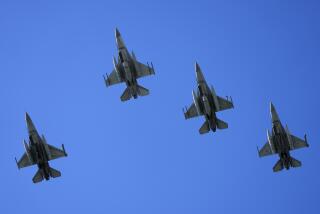Gunships Against Human Rights
- Share via
Monday may be a record payday for one of two U.S. weapons makers, either Boeing Aircraft or Bell Helicopter Textron. On that day, Turkey is scheduled to award a $4-billion contract for 145 attack helicopters, one of the largest single arms deals in history.
International competition for the lucrative project has been fierce, with five companies submitting bids, but Boeing’s Apache Longbow and Bell’s Super Cobra are considered the odds-on favorites to win the award.
About 80% of the Turkish arsenal is U.S.-made, and the Turkish army has relied on Sikorsky Blackhawks and both Apache and Cobra gunships to win the long war with Kurdish rebels in the country’s southeast.
In 1997, the Clinton administration granted Boeing and Bell market licenses to build the attack helicopters, brushing aside human rights objections from Amnesty International and Human Rights Watch about Turkey’s abuse of its ethnic population.
If one of the American companies receives the new contract, the administration may again override human rights concerns and, in effect, broker the sale to Turkey by granting the necessary export licenses.
American-made helicopters are well known to the Kurds. I have often encountered refugees from destroyed villages in southeast Turkey whose only English--delivered in a thick Kurdish accent--were the words “Sikorsky” and “Cobra.” Villagers know that the soldiers who burn their houses land in Blackhawk helicopters, the troop transports that are made by the Connecticut-based Sikorsky Co. And they easily recognize the rocket-equipped Cobras, which are manufactured at the Bell Textron plant in Fort Worth, Texas.
Turkish Kurdistan is a rugged, mountainous region, and helicopters have proved essential in the army’s scorched-earth campaign. So far, more than 3,000 Kurdish villages have been burned, depriving the guerrillas of vital logistical support; estimates of civilian Kurds displaced by the war range from 500,000 to 2 million.
It has been a dirty war, and both sides have been guilty of atrocities.
Last year, after Turkey captured rebel leader Abdullah Ocalan, tried him for treason and sentenced him to death, it looked as if the 15-year-old uprising might fade away. Ocalan sent out word from prison for his fighters to quit, and they eventually issued a formal declaration to end the armed struggle and to work for Kurdish rights “within the framework of peace and democratization.”
Last December, the European Union, after years of rejection, voted to consider Turkey for EU admission, but only on the condition that it clean up its human rights record. Among other things, Europe wants Turkey to negotiate legitimate and long-standing Kurdish grievances in education, language and cultural expression.
Now the EU may be having second thoughts. Last month, Turkey blocked an EU delegation from visiting Leyla Zana, the imprisoned Kurdish member of parliament who has received the EU’s peace prize. Then a Kurdish educational foundation was indicted on criminal charges of “inciting separatist propaganda” because it advertised a scholarship in an Istanbul newspaper for students who could “read and write in Kurdish.”
Two weeks ago, the government ordered a CNN television affiliate off the air for 24 hours because a reporter asked a guest whether history might one day regard Ocalan as a Turkish version of South African revolutionary Nelson Mandela.
A few days later, Turkey arrested the Kurdish mayors of three cities on vague charges of separatism. Subsequently, authorities arrested hundreds of supporters who were peacefully protesting the detention of the mayors.
There are 37 elected Kurdish mayors, and many observers had hoped that their political leadership would provide a nonviolent alternative to the bloody civil war in Turkey that since 1984 has taken 37,000 lives, most of them Kurds.
The timing of the $4-billion helicopter deal is wrong. If either Boeing or Bell Textron gets the green light from Turkey, the Clinton administration should hold up the arms sales until Ankara shows a willingness to deal democratically with its ethnic population.
More to Read
Sign up for Essential California
The most important California stories and recommendations in your inbox every morning.
You may occasionally receive promotional content from the Los Angeles Times.













